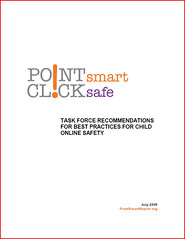 A major new online child safety task report by the "Point Smart. Click Safe." Blue Ribbon Working Group has just been released. First, some background. In June 2007, the National Cable & Telecommunications Association (NCTA), the principal trade association of the cable industry in the United States, announced "Cable Puts You in Control: PointSmart. ClickSafe." a new campaign by its members to offer parents assistance in keeping their children safe online. As part of the initiative, the NCTA hosted a major online child safety summit and also announced the formation of the "Point Smart. Click Safe. Blue Ribbon Working Group" in partnership with the Internet KeepSafe Coalition (iKeepSafe) and Common Sense Media. These three organizations, along with the cable industry's "Cable in the Classroom" program, agreed to bring together a collection of online safety experts from many disciplines to study these issues and develop a set of "best practice" recommendations that could be implemented across the Internet industry. [Disclosure: It was my pleasure to serve as a member of this blue ribbon working group.]
A major new online child safety task report by the "Point Smart. Click Safe." Blue Ribbon Working Group has just been released. First, some background. In June 2007, the National Cable & Telecommunications Association (NCTA), the principal trade association of the cable industry in the United States, announced "Cable Puts You in Control: PointSmart. ClickSafe." a new campaign by its members to offer parents assistance in keeping their children safe online. As part of the initiative, the NCTA hosted a major online child safety summit and also announced the formation of the "Point Smart. Click Safe. Blue Ribbon Working Group" in partnership with the Internet KeepSafe Coalition (iKeepSafe) and Common Sense Media. These three organizations, along with the cable industry's "Cable in the Classroom" program, agreed to bring together a collection of online safety experts from many disciplines to study these issues and develop a set of "best practice" recommendations that could be implemented across the Internet industry. [Disclosure: It was my pleasure to serve as a member of this blue ribbon working group.]
Today, the "Point Smart. Click Safe." working group produced its final report and concluded that:
Ensuring children's online safety is a difficult and complex task that calls for input from and action by a wide variety of stakeholders. There is no "silver bullet"--no single technology or approach that has proved effective. Rather, what is required is:
- A combination of different technologies,
- Continuing digital literacy education for parents, educators, and children, and
- Active participation by all concerned companies, groups and individuals.
Similarly, a singular focus on safety is insufficient. Children must learn to minimize risks but also learn appropriate and ethical behaviors in this digital world. In addition, they need an understanding of media literacy, in order to be able to think critically about the content they consume and increasingly create. Therefore, best practices must be part of a larger effort to provide an entertaining, educational, and safe experience for children.
Compared to previous online child safety task forces, which I will discuss in a subsequent post, the major contribution of this task force was its focus on detailed industry best practices that various online providers could adopt to help parents, policymakers, and law enforcement better keep kids safe online. As the working group's final report noted:
It should be easy for parents and others to find clear and simple explanations of what information and safety elements exist, how they function, and what a user can do in various circumstances. Therefore, best operating practices should:
- Use clear and common language,
- Be consistent and transparent, and
- Provide information and tools that can vary by age and stage of the user.
These best operating practices should be crafted so that they can be:
- Modified for a specific service or application (e.g. ISP, blog, chat, social network),
- Scaled based on the number of intended or actual users,
- Designed and created as part of the product development cycle, and
- Continuously updated to reflect growth and change in the application or service.
The task force then provided a detailed outline of the many tools and strategies that industries could use to accomplish these goals. I encourage you to check out the "
Recommendations for Best Practices" section of the report for more detail since there are far too numerous to itemize here.
As I will point out in a related post later, the "Point Smart. Click Safe." working group's findings and recommendation were very much in line with what 4 previous online safety task forces have concluded. Again, more on that later. For now, read this report!
